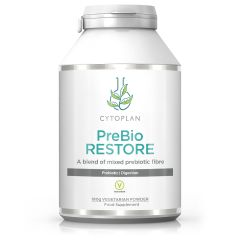I've just finished antibiotics, what can I take to support my gut?
Whilst antibiotics absolutely save lives, there has been a long-standing culture of over-prescription. This has led to problems that we are now experiencing such as antibiotic resistance and can also be at the heart of many of the gastrointestinal symptoms that are so commonly experienced today.
The good news? If you do need to take antibiotics, there are lots of steps you can take to minimise the potential side effects and support your gut health.
What is the gut microbiome?
Our microbiome is made up of a high diversity of micro-organisms, such as bacteria, protozoa, fungi and viruses, that all live together in homeostasis in a healthy digestive tract. These microbes play a fundamental role in many areas of health, including immunity, digestion, cognition, skin health and inflammation. Any disruptions to this delicately balanced ecosystem can be detrimental to our overall health and wellness.
Antibiotics and the microbiome
Most of the antibiotics available on the market have a broad spectrum of action; they affect not only harmful bacteria, but also the healthy ones and therefore can disrupt the intricate ecosystem of our gut bacteria. Diversity is the key to a healthy gut, but there is often a decrease in bacterial diversity following antibiotic treatment, which leaves the microbiome susceptible to the overgrowth of pathogenic or undesirable bacteria, further disrupting the ecosystem.
Another way in which antibiotics can further disrupt gut health is by damaging the lining of our gastrointestinal (GI) tract. This might be partly due to the disruption of the microbiome, and partly due to the fact that antibiotics can reduce the level of butyrate; a short chain fatty acid used by the cells of the GI tract as fuel and to aid repair and rejuvenation. The resulting intestinal permeability (or leaky gut) can be at the heart of many chronic conditions. You can read more on the topic here.
Antibiotic-associated diarrhoea and other digestive complaints are common side effects of antibiotic treatment and can sometimes occur for up to two months upon completion of treatment.
How do you support the microbiome after antibiotics?
Supporting the microbiome, before, during and after antibiotics is important to prepare, support and promote the healing of the gastrointestinal tract and reduce the negative effects on the microbiome.
Probiotic foods
Fermented foods bring a wealth of benefits to the gut microbiome. Fermented foods are naturally rich in probiotics and have been found to help balance the microbiome. For the best sources of probiotic-rich fermented foods opt for unpasteurised kimchi, pickled foods, kombucha, sauerkraut, kefir, miso and live unpasteurised yoghurt.
Live bacteria supplements
Probiotic supplements containing live bacteria have been shown to significantly support gut health through various mechanisms, such as enhancing species diversity and supporting the integrity of the GI tract lining. Probiotics can also help to reduce or resolve antibiotic-associated side effects such as diarrhoea.
Something we are frequently asked is whether it is pointless to take probiotics while you are on antibiotics as they could cancel each other out – but in fact, taking probiotics during your course of antibiotics can be extremely supportive for your gut health.
We advise that your probiotic is taken at least 2 hours away from your medication.
Saccharomyces boulardii is a probiotic yeast that may help to prevent antibiotic-associated diarrhoea and help restore microbial balance after treatment.
Prebiotics
Prebiotics are specific fibres that can be digested by the gut microbiota. By providing an energy source for the friendly bacteria, prebiotics can promote diversity, and positively affect the function of the microbiome. The best way to obtain a great level of prebiotics is to consume a wide variety of different plant foods each day.
If considering prebiotic supplements, it is important to take a range of different prebiotics fibres, as different prebiotics will support different friendly strains of bacteria.
Following antibiotic therapy, we recommend that you support your gut with probiotics for at least 2 weeks before introducing a prebiotic supplement, to avoid any potential negative side effects such as bloating or wind.







